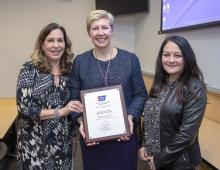
Dr. Christopher Wheldon Recognized as 2019 Sexual & Gender Minority Community and Ally Leader Awardee
August 2, 2019
Dr. Christopher Wheldon, a recent CPFP alumnus, was honored with the 2019 Sexual & Gender Minority (SGM) Community and Ally Leader Award. This award honors NIH employees and fellows for their…
Dr. Christopher Wheldon, a recent CPFP alumnus, was honored with the 2019 Sexual & Gender Minority (SGM) Community and Ally Leader Award. This award, sponsored by the NIH Office of Equity, Diversity, and Inclusion, honors NIH employees and fellows for their exemplary work as researchers advancing the frontiers of SGM research.
Dr. Wheldon was recognized for his research focusing on health topics critical to the SGM community, including HPV awareness, culturally competent care, and tobacco use among sexual minorities. His July 2019 publication in LGBT Health, “Cigarette Smoking Among Youth at the Intersection of Sexual Orientation and Gender Identity,” aims to identify subgroups of SGM youth who are most vulnerable to tobacco use. The study suggests that transgender boys may be at higher risk for early and current cigarette use regardless of their sexual identity and emphasizes a need for focused attention within specific subgroups of SGM youth in tobacco control research and practice.
Dr. Wheldon credits many players at the NCI for supporting his research endeavors: “The NCI, and the CPFP in particular, have provided great mentorship, encouragement, and support to advance my research program focused on cancer disparities in SGM populations. A special thanks is in order to Dr. Richard Moser, my preceptor, and the Behavioral Research Program for being passionate advocates of their fellows.” In August 2019, Dr. Wheldon will begin the next chapter in his career as Assistant Professor of Social and Behavioral Sciences in the College of Public Health at Temple University.

Dr. Shirley Bluethmann Receives American Cancer Society Funding, Studies Exercise and Medication Adherence in Older Breast Cancer Survivors
May 1, 2019
CPFP alumna Dr. Shirley Bluethmann received a Mentored Research Scholar Grant for Applied and Clinical Research from the American Cancer Society (MRSG-18-136-01-CPPB) for her project "Using Exercise…
CPFP alumna Dr. Shirley Bluethmann received a Mentored Research Scholar Grant for Applied and Clinical Research from the American Cancer Society (MRSG-18-136-01-CPPB) for her project "Using Exercise to Improve Arthralgia and AI Adherence in Older Cancer Survivors: (the REJOIN Trial)." The $728,000 career development award will support Dr. Bluethmann as she pursues specialized training in cancer and aging and investigates the effects of a self-management program, combining education and exercise, on joint pain associated with aromatase inhibitors (a treatment commonly prescribed to women with hormone-sensitive breast cancer).
Dr. Bluethmann believes the study, focusing on breast cancer survivors over the age of 65, has the potential to “change clinical practice by increasing use of an evidence-based, non-pharmacological method for the management of a common but problematic treatment symptom.” According to Dr. Bluethmann, the CPFP helped her build her brand as a national leader in behavioral research in cancer and aging and thus played a key role in preparing her for this project and American Cancer Society (ACS) recognition.
Dr. Bluethmann is an assistant professor in the Department of Public Health and Sciences at Penn State College of Medicine and an associate member of the Penn State Cancer Institute. In addition to her ACS funded research, Dr. Bluethmann published in Nature Communications in January 2019. Her article “Suicide among cancer patients” seeks to uncover the prevalence and risk of suicide in adults diagnosed with cancer.
Image Credit: Penn State College of Medicine

Dr. Loomans-Kropp, Dr. Pierre-Victor, with Division of Cancer Prevention Mentors, Publish on Personalized Risk
April 5, 2019
CPFP fellow Dr. Holli Loomans-Kropp, recently published a review in Precision Oncology titled “Cancer prevention and screening: the next step in the era of precision medicine.” In Feb. 2019, current…
Current CPFP fellow Dr. Holli Loomans-Kropp, recently published a review in Precision Oncology titled “Cancer prevention and screening: the next step in the era of precision medicine.” In this piece, Loomans-Kropp and her Division of Cancer Prevention (DCP) preceptor and Chief of the Gastrointestinal and Other Cancers Research Group, Dr. Asad Umar, summarized the current state of cancer prevention efforts along the cancer control continuum. They discussed historical efforts in prevention, current prevention and early detection recommendations, and current knowledge of the molecular factors that may impact one’s risk of cancer. The review also explored the future of cancer prevention in the current age of precision medicine and personalized care.
Loomans-Kropp and Umar highlighted the necessity of combining generalized cancer prevention techniques with individualized methods. Loomans-Kropp noted, “Better understanding one’s personalized risk of one, or multiple, cancers may better inform how she or he should approach cancer prevention. This type of knowledge will allow for better and more precise guidance in cancer prevention.”
In February 2019, current CPFP fellow Dr. Dudith Pierre-Victor, with mentor and Chief of DCP’s Early Detection Research Branch Dr. Paul Pinsky, published a study in JAMA Internal Medicine. The study, titled “Association of Nonadherence to Cancer Screening Examinations with Mortality from Unrelated Causes: A Secondary Analysis of the PLCO Cancer Screening Trial” examined the association between nonadherence to cancer screening tests and mortality in the Prostate, Lung, Colorectal Ovarian Cancer Screening Trial (PLCO), excluding mortality from cancer studied in the trial. Pierre-Victor and Pinsky observed higher mortality among participants who were nonadherent to baseline cancer screening tests compared to those who fully adhered. A general behavior profile of nonadherence, of which nonadherence specifically with trial protocol screening is a marker, was found to be associated with a very substantial increased risk of death.
Dr. Pierre-Victor stressed the impact of this study on middle-aged and older populations: “Study participants’ adherence profile is a behavioral characteristic that merits investigation since it is associated with an increased risk of mortality among middle-aged and older adults.”

Dr. Emily Vogtmann Appointed Earl Stadtman Tenure-Track Investigator
March 1, 2019
CPFP alumna Dr. Emily Vogtmann has been named Earl Stadtman Tenure-Track Investigator with the NCI Division of Cancer Epidemiology and Genetics (DCEG). These tenure-track positions are for creative,…
CPFP alumna Dr. Emily Vogtmann has been named an Earl Stadtman Tenure-Track Investigator with the NCI Division of Cancer Epidemiology and Genetics (DCEG). These tenure-track level positions are for creative, independent thinkers eager to take on novel, high-impact research.
As an Earl Stadtman Investigator, Dr. Vogtmann will conduct research focusing on how the human microbiota is related to cancer risk, both how it directly associates with cancer and how it may be a mediator in the relationship between specific exposures and cancer. She is eager to begin new studies that will measure bacteria and other microbes: “These different types of microbes may interact to change the risk of various cancers, such as cancer of the oral cavity. I am also planning on looking at whether microbial changes over time may be related to cancer risk.”
The CPFP supported Dr. Vogtmann as she explored various research opportunities at the NCI. In her new role, she has the potential to provide similar support to future fellows. Dr. Vogtmann expressed, “Both of my post-doctoral mentors were former Cancer Prevention Fellows. And now I’m looking forward to mentoring trainees and could one day be a preceptor for a new Cancer Prevention Fellow.”

Dr. Elizabeth Salerno Receives National Recognition for Study: “Dose-Response Effects of Acute Aerobic Exercise on Cognitive Function in Breast Cancer Survivors”
February 1, 2019
This past year, CPFP fellows received prestigious awards, published manuscripts in leading journals, and carried out impactful cancer prevention research. See what our fellows accomplished throughout…
CPFP Fellow, Dr. Elizabeth Salerno, received meritorious abstract and citation awards from the Society of Behavioral Medicine (SBM) during their 39th Annual Meeting and Scientific Sessions in April 2018. Dr. Salerno received these awards for her abstract titled, “Dose-Response Effects of Acute Aerobic Exercise on Cognitive Function in Breast Cancer Survivors,” which was also featured as a press release to leading media outlets during the meeting.
Cancer survivors often experience cognitive problems, including poor memory, loss of concentration, slower processing of information, and reduced executive function. Dr. Salerno’s study, conducted at the University of Illinois at Urbana-Champaign, explored the effects of exercise on cognitive function in breast cancer survivors. Using a sample of 48 breast cancer survivors, she and her colleagues administered a battery of cognitive tasks before and after different durations of exercise and sitting. The results showed that women either maintained or improved their performance on the cognitive tasks after some level of exercise, compared to poorer performance after sitting.
Dr. Salerno highlighted the impact of this study on populations of breast cancer survivors: “Cancer survivors tend to score worse on a wide variety of cognitive functioning tasks compared to people without cancer. These findings suggest that walking for 20-30 minutes may help breast cancer survivors maintain or improve their cognitive function. We know that exercise protects against a host of diseases already, and moderate exercise may also help breast cancer survivors protect their cognitive functioning.”